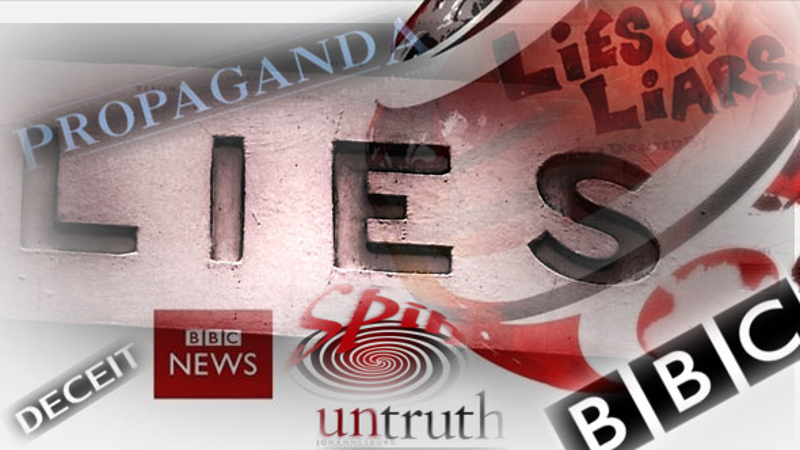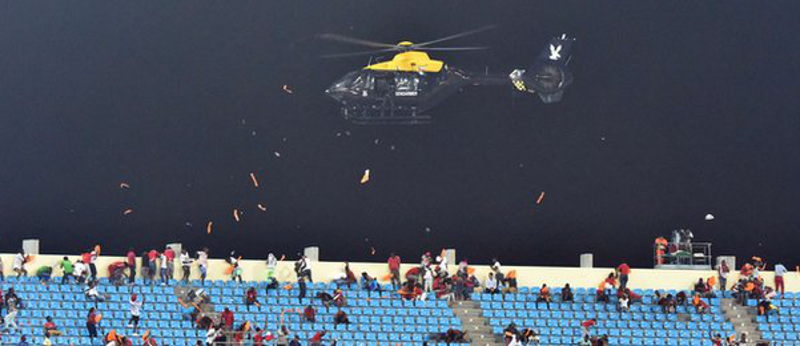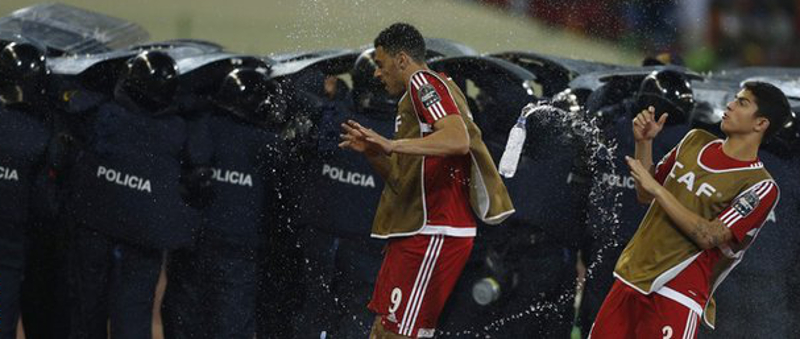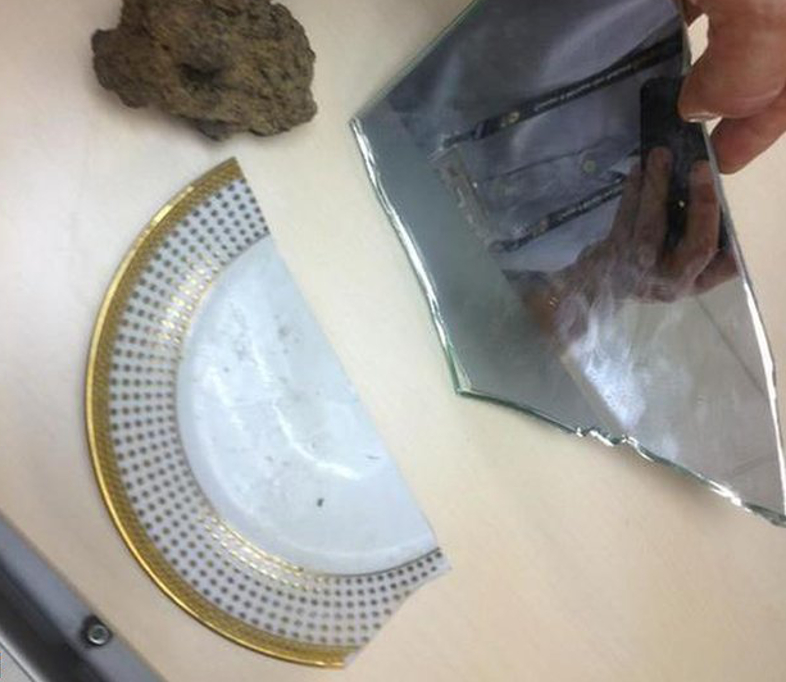Earlier today The Volta Times reported the occurrences between the Ghana 3-0 win over Equatorial Guinea. We have recently been alerted to another account, albeit a false one, where the BBC employs propaganda to suggest that a violent, war-like eruption occurred at the game.
That presumption is completely and abundantly false. We are astonished that a supposedly reputable publication would go to such lengths to mar the African Cup of Nations.
We outline several careless exaggerations in the BBC reports.
BBC writer Ian Hughes writes that: “Ghana fans massed behind a goal after 82 minutes of the game to seek refuge from missiles being thrown at them.”
Seek refuge from missiles? In the words of Ian Hughes, we are no longer Equatorial Guinea and Ghana in the midst of a football game, we are soldiers in the middle of a military battlefield launching missiles and seeking refuge!
Hughes continues, “Bottles rained down as police battled to gain control, while a helicopter hovered over the stadium.” Clearly, Ian Hughes is describing the latest Hollywood movie he has seen.
No bottles “rained down” in a torrential downpour from the sky into the stadium. There was no violent battle between police and Equatorial Guinea fans.
Fans only stood rather motionless on the sidelines of the pitch, which was the sole cause of the delay.
As far as the helicopter goes, Hughes writes, “A police helicopter caused a commotion inside the stadium as it sprayed around debris.”
That statement is rather nonsensical.
Hughes makes the audacious claim that Equatorial Guineans would collect debris only to put it into a helicopter and then scatter it amongst the crowd. Yet as we all know, helicopters blow an immense amount of air in their circumference, creating a centrifugal force that would easily disperse napkins, papers, or any other items of lightweight left behind in the stadium.
We must understand that Ian Hughes and the BBC would go to great lengths, even manufacturing falsehoods, to interpret a picture in any way that will present Africa in a negative light.
Hughes and the BBC, in another article, throw in several references to fans needing to “seek safety,” chairs being “ripped from the stands,” “blood-spattered,” and a spectator “trying to attack the referee.” The BBC article calls the spectacle “a war zone” and writes “the media sought safety any way that they could.”
To Ian Hughes and the BBC, even water is a weapon in Africans’ hands. Hughes writes: “Equatorial Guinea players were also sprayed with water from the bottles thrown from the stands.” The photographer labeled the picture below “water riot.”
Every picture the BBC uses to show the game either features the police or players in an awkward stance. The BBC would like its readers to think that Africans are chaotic, violent, and unstable.
They even show this picture below of “objects removed from the pitch by BBC reporter Piers Edwards.” Presumably the only objects Piers Edwards grabbed were a rock and pieces of broken glass. What happened to all the water “bottles rained down as police battled to gain control”?
Piers Edwards and the BBC only desire to create the illusion that Africans are violent and intended to harm one another–with shards of glass and hard objects, no less.
As immature as the Equatorial Guinea fans were for standing alongside the pitch, there was absolutely no malicious intent toward any Africans. It is however obvious that the BBC media like to take liberties with pictures and throw around statements loosely without attaching them to any genuine truths.
We understand that reporters like Ian Hughes and those at the BBC are conditioned to sensationalize events and link violence to Africa and her people. They aim to depict Africa as an untamed land with uncultivated people. They like to pretend to be the peacekeepers and use that impetus to infiltrate our lands.
But why, then, does the conflict erupt when they come and subside when they leave?
Overall, the BBC fabricates a story in an attempt to depict a violent and savage Africa. However, the event, a standoff in which Equatorial Guinea fans never set foot onto the playing area, was totally non-violent, only a delay of game for both teams.
This false report only emphasizes the need for Africans to rely upon their own sources of media, or else be subject to the repeated caricatures of themselves that are regularly painted in the British and American depictions of African citizens.
Surely there are circumstances of war where violent acts happen. But this semi-final football game between two African nations, Ghana and Equatorial Guinea, was most certainly not one of them.















That is not new. If people are dancing in Africa, the BBC would say they are drenching. If Africans are praying they would say they are preying on other Africans. If Africans are farming crops they would say they are suffering from farming. If Africans go to Church they would say the devil is chasing Africans. If Africans fight for freedom they would call them agitators. If Africans want want a fair price for their good they say Africans are greedy.
Nothing about the western media is new. This is what they do. Lie!
The BBC is the reservoir of lies. I could go to a pre-school and take
pictures for children to make it plausible that there is a war in all
pre-school.
This second article of yours is pointed. I love it. I am tired of the BBC writing the nonsense it writes.
LOL. If I hadn’t watched the game, reading the BBC I would have thought there was civil war in Equatorial Guinea. They are sensational queens.
The BBC can’t even write an article about soccer – that is how pathetic they are – posting a picture slide show with captions as an article. They are pathetic really. Thanks for sharing. You are a master editor, no doubt. Thanks again!
If the BBC saw a spoon drop from the table in my room, they would go to their gullible people and say I dropped a bomb on my town. This is who they are – they lie!
As for the BBC, New York Times, Washingtonposts, Financial Times, nothing good happens in Africa. To them and for them, Africa is filled with waring factions. Let them believe their lies and let them keep sensationalizing news from Africa.
Like the rapper T.I. would say: “My life, your entertainment, you watch it while I live it”. Our lives are their entertainment, we’ll live and they can watch – the vultures that they are.
I coudn’t agree more. They act like vultures. Looking for the next trouble. if there is none, they will make it up. The term ‘Voyeur’ must come from the latin ‘Vulture’!
As in Voyeurism is to spying on private acts while Vulturism is to spying on private sorrow. Yes, they are voyeurs, they enjoy watching Africa suffer or making it up in their minds that Africa is suffering – and that make them Vultures I guess?
Shun that news organization. Just shun them. They’ve never been the agents of good.
Perhaps African soccer will wake from this, dust herself and move on more gallantly than ever! God Bless.
As for the BBC they are up to fabricating anything about Africa. Anything really.